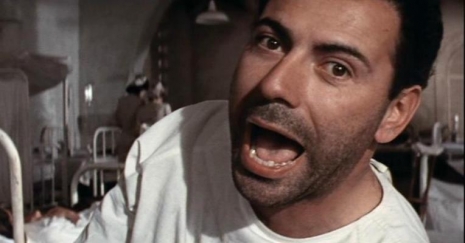
Alan Arkin’s been one of my favorite actors ever since I saw Wait Until Dark sometime in my tween years. With the help of a switchblade hidden in a statuette of the Virgin Mary, his character, who calls himself Harry Roat Jr. or Sr. depending on the circumstance (the plot is very elaborate), was one of the most deeply sinister creations of “classic cinema” I had ever seen to that point. I can’t say I cared much for Little Miss Sunshine, the 2006 movie that finally won Arkin an Oscar, but in a wide range of movies including The In-Laws, Glengarry Glen Ross, Catch-22, The Seven-Per-Cent Solution, and So I Married an Axe Murderer, Arkin has consistently supplied me (and countless others) with heaping doses of cinematic pleasure.
Arkin became truly famous around the time he appeared in Norman Jewison’s 1966 satire The Russians Are Coming, the Russians Are Coming, but by then he’d packed a lifetime into his 30-odd years. In addition to being a standout member of Second City, one of the nation’s first comedy improv groups (an experience he discusses at some length in his 2011 memoir An Improvised Life), but he’d also spent several years as a participant of America’s thriving folk music scene.

In the mid-1950s, Arkin, then in his early twenties, was in a vocal/folk group called the Tarriers. That group had the good fortune to learn about a certain Jamaican folk song from a folk singer named Bob Gibson. The Tarriers had a significant hit with the song, which bears the title “The Banana Boat Song” but is more commonly known as “Day-O,” even though the song rapidly became more closely associated with a young African-American singer named Harry Belafonte. As Bob Leszczak writes in Who Did It First?: Great Pop Cover Songs and Their Original Artists, “The first single version was by the Tarriers very late in 1956 on the Glory Records label. They beat out RCA’s choice to release Belafonte’s version on a 45 by a matter of weeks. The Tarriers’ version boasts different writers—Carey, Darling, and Arkin. Indeed, the same Alan Arkin who became an Oscar winner years later.”
During the same period, Arkin released some material under his own name, including a 1955 10-inch with the convoluted title Folk Songs (And 2½ That Aren’t)—Once Over Lightly and a 1958 single with the Woody Guthrie classic “900 Miles.”
As Paul Colby observes in his memoir of his years at the Bitter End, an important folk nightclub in New York City,
Years later when Arkin and [Theodore] Bikel starred in the movie The Russians Are Coming, the Russians Are Coming, I heard that in between takes, the movie set was very often turned into the stage of the Bitter End as both actors sang folk songs to pass the time. People like Bikel, Arkin, and Leon Bibb were very good actors, and whenever they doubled as folksingers, their performances were tremendously effective because they could really act out a song.
The Tarriers, “The Banana Boat Song”:
Arkin’s rendition of “I Like You,” only lip-sync’d by a bizarre penis janitor (?) named “Singalong Paul” to supply visual verve:
“900 Miles”: